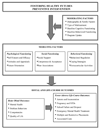Fostering healthy futures: an innovative preventive intervention for preadolescent youth in out-of-home care
- PMID: 18422051
- PMCID: PMC2613856
Fostering healthy futures: an innovative preventive intervention for preadolescent youth in out-of-home care
Abstract
Although we have not yet demonstrated empirically that the FHF program is effective in addressing mental health, behavioral, and academic issues among preadolescent youth placed in foster care, we believe we have a very promising model. We have successfully negotiated many challenges of conducting a RCT within a child welfare setting, in large part because of the collaboration and support of our community partners. The ultimate goal of this research is to develop more efficacious interventions, thereby reducing adverse life-course outcomes and promoting healthy futures, not only for youth in out-of-home care, but for all youth at risk.
Figures
References
-
- Berliner L, Kolko D. What works in treatment for abused children. In: Kluger MP, editor. What works in child welfare. Washington, D.C.: Child Welfare League of America; 2000. pp. 97–104.
-
- Bolger KE, Patterson CJ. Sequelae of child maltreatment: Vulnerability and resilience. In: Luthar SS, editor. Resilience and vulnerability: Adaptation in the context of childhood adversities. New York: Cambridge; 2003. pp. 156–181.
-
- Brofenbrenner U. The ecology of human development: Experiments by nature and design. Cambridge, MA: Harvard University Press; 1979.
-
- Brofenbrenner U. Developmental ecology through space and time: A future perspective. In: Moen P, Elder GH Jr, Luscher K, editors. Examining lives in context. Washington, D.C.: American Psychological Association; 1995. pp. 619–647.
-
- Burns BJ, Phillips SD, Wagner HR, Barth RP, Kolko DJ, Campbell Y, et al. Mental health need and access to mental health services by youths involved with child welfare: A national survey. Journal of the American Academy of Child and Adolescent Psychiatry. 2004;43:960–970. - PubMed

